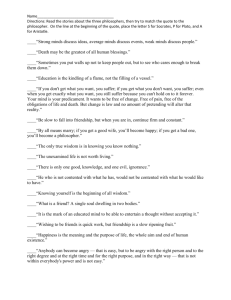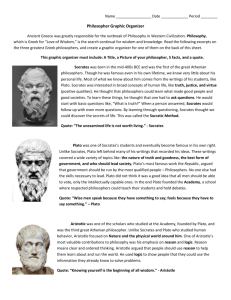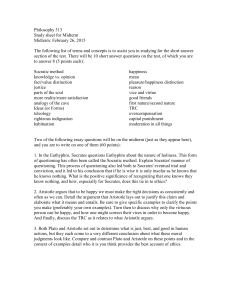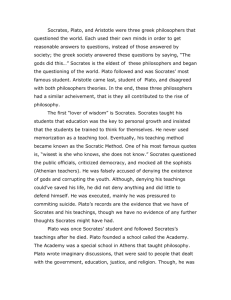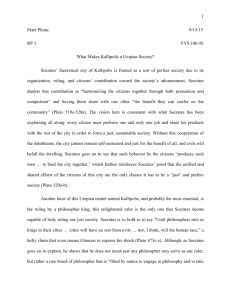Socrates, Plato and Aristotle
advertisement
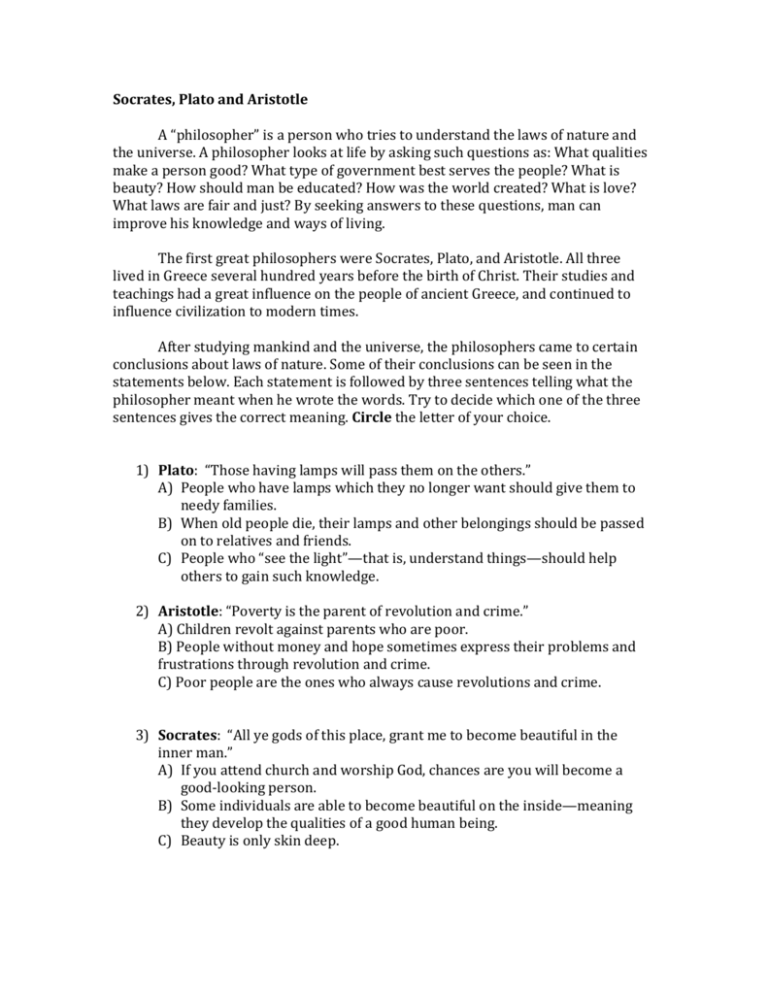
Socrates, Plato and Aristotle A “philosopher” is a person who tries to understand the laws of nature and the universe. A philosopher looks at life by asking such questions as: What qualities make a person good? What type of government best serves the people? What is beauty? How should man be educated? How was the world created? What is love? What laws are fair and just? By seeking answers to these questions, man can improve his knowledge and ways of living. The first great philosophers were Socrates, Plato, and Aristotle. All three lived in Greece several hundred years before the birth of Christ. Their studies and teachings had a great influence on the people of ancient Greece, and continued to influence civilization to modern times. After studying mankind and the universe, the philosophers came to certain conclusions about laws of nature. Some of their conclusions can be seen in the statements below. Each statement is followed by three sentences telling what the philosopher meant when he wrote the words. Try to decide which one of the three sentences gives the correct meaning. Circle the letter of your choice. 1) Plato: “Those having lamps will pass them on the others.” A) People who have lamps which they no longer want should give them to needy families. B) When old people die, their lamps and other belongings should be passed on to relatives and friends. C) People who “see the light”—that is, understand things—should help others to gain such knowledge. 2) Aristotle: “Poverty is the parent of revolution and crime.” A) Children revolt against parents who are poor. B) People without money and hope sometimes express their problems and frustrations through revolution and crime. C) Poor people are the ones who always cause revolutions and crime. 3) Socrates: “All ye gods of this place, grant me to become beautiful in the inner man.” A) If you attend church and worship God, chances are you will become a good-looking person. B) Some individuals are able to become beautiful on the inside—meaning they develop the qualities of a good human being. C) Beauty is only skin deep. 4. Aristotle: “Shame is an ornament to the young, a disgrace to the old.” A) When youngsters do wrong, it is a shame; when adults do wrong, it is a disgrace. B) Parents who have been disgraced by their children’s bad behavior should shake a finger and say, “Shame on you!” C) Some young people think doing wrong is fun and entertaining, while grown ups who do wrong feel embarrassed and disgraced. 5. Plato: “Out of the frying pan into the fire.” A) Never fry anything that is still alive—like a fish—because it may jump out of the pan and into the fire. B) Individuals who too often get themselves “into the frying pan”—that is, into trouble—should be severely punished. C) When people have a problem and try to solve it, they sometimes find themselves getting into an even worse situation. 6. Socrates: “Fame is the perfume of heroic deeds.” A) Brave acts or great accomplishments can make a person famous. B) Famous people and heroes always wear perfume so they will smell good when admirers crowd around. C) Famous people, perfume, and heroes have a lot in common. 7. Plato: “Necessity, who is the mother of invention.” A) It is a necessity that mothers have new appliances to make housework easier. B) Machines, automobiles, and other items have been invented because people need them. C) Besides men, we need more mothers who are willing to spend time inventing things. Although Socrates, Plato, and Aristotle lived long ago, much of what they said is still true in today’s world. Choose any 3 statements from the following list which you agree with. Copy these statements in the appropriate spaces following the list, then briefly explain why you think the sayings still have meaning in present times. Then, choose 2 statements you do not agree with, write them down, and explain why you think each saying is not true today. 1. “It is better to be unborn than untaught, for ignorance is the root of misfortune.” 2. “Even when laws have been written down, they ought not always to remain unaltered.” 3. “Educated men are as much superior to uneducated men as the living are to the dead.” 4. “The male is by nature superior, and the female inferior.” 5. “When there is an income tax, the just man will pay more and the unjust less on the same amount of income.” 6. “A fit of laughter which has been indulged to excess almost always produces a violent reaction.” 7. “The direction in which education starts a man will determine his future life.” 8. “No evil can happen to a good man, either in life or after death.” 9. “False words are not only evil in themselves, but they inflect the soul with evil.” 10. “Love will make men dare to die for their beloved—love alone; and women as well as men.” 11. “No one finds fault with defects which are the result of nature.” 12. “You are young my son, and, as the years go by, time will change and even reverse many of your present opinions.” Statements agreeing with: Quote:_________________________________________________________________________ ________________________________________________________________________________ ________________________________________________________________________________ Why agree? _________________________________________________________________________________________________ _________________________________________________________________________________________________ _________________________________________________________________________________________________ Quote:_________________________________________________________________________ ________________________________________________________________________________ _______________________________________________________________________________ Why agree? _________________________________________________________________________________________________ _________________________________________________________________________________________________ _________________________________________________________________________________________________ Quote:_________________________________________________________________________ ________________________________________________________________________________ ________________________________________________________________________________ Why agree? _________________________________________________________________________________________________ _________________________________________________________________________________________________ _________________________________________________________________________________________________ Statements Disagreeing With Quote:_________________________________________________________________________ ________________________________________________________________________________ ________________________________________________________________________________ Why disagree? _________________________________________________________________________________________ _________________________________________________________________________________________ _________________________________________________________________________________________ Quote:_________________________________________________________________________ ________________________________________________________________________________ ________________________________________________________________________________ Why disagree? _________________________________________________________________________________________ _________________________________________________________________________________________ _________________________________________________________________________________________ Below are the first words of four more saying from the philosophers Socrates, Plato, and Aristotle. Finish the sentences by putting your own words in the spaces. You may make them funny or serious. Socrates: “Bad men live that they may eat and drink, whereas good men eat and drink that they may ___________________________________________.” Socrates: “As for me, all I know is that I __________________________________________.” Plato: “Even the gods love _______________________________________.” Aristotle: “No one loves the man whom he __________________________________.”

